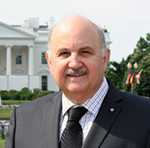By Shoshana Bryen and Stephen Bryen


WASHINGTON, D.C. — The president is being asked by the Pentagon to provide U.S. ground troops to fight ISIS in Syria. If the president is wise, he will run as fast as he can the other way.
There are four potential traps here:
• The cost in American lives;
• The nature of the Syrian civil war that encompasses the fight against ISIS, which means we may find ourselves on the battlefield with Russia, Iran, and the genocidal government of Syria;
• Finding ourselves with the Turks against the Kurds; and
• Finding ourselves with the Kurds against the Turks.
Syria is a quagmire – ask the Russians. The late 2016 battle for Aleppo required heavy bombing; massive artillery; and even, allegedly, chemical weapons. In Aleppo overall, there were 31,000 casualties – 22,633 men, 2, 849 women, and 4,548 children. Overall, 76% of the casualties were civilian. Most were caused by Russian bombing and Syrian government and allied troops – Hezb’allah and Iran – on the ground.
Daily operations in Syria are under Russian-Syrian cognizance. The Russians supply air power, combat intelligence, and special operations, targeting anti-regime forces and leaders they want to liquidate. Syrian army forces, Iranian-backed forces (many of them irregular and imported from Pakistan and Afghanistan), and Hezb’allah do the dirty work on the ground. The Russians are determined to minimize their own casualties. After the Afghan debacle – 13,310 dead, 35,478 wounded, and more than 300 missing – the Russian public has a low tolerance for battlefield casualties, and in today’s world where the internet reigns supreme, keeping news about deadly encounters from the Russian people is a losing battle, and the authorities know it.
Some, including Russian president Vladimir Putin, have proposed that the U.S. team up with Russia. But Defense Secretary James Mattis has said that while we might find ways to cooperate politically, direct military collaboration with the Russians is not in the cards, most importantly because the U.S. arms and trains some Syrian rebels the Russians call “terrorists” and against whom they and the Syrian government are fighting. It is inconceivable that the U.S. would fight in coordination with Russia’s allies, Iran and Hezb’allah – who pose a grave threat to Israel, threaten American sailors in the Persian Gulf, and support Saudi Arabia’s enemy, the Houthi rebels in Yemen.
In addition to their battle standards being anathema to Americans, the potential for U.S. casualties in Syria is high. The Second Battle of Fallujah was the most costly engagement for American forces since Hue, Vietnam in 1968. In Fallujah in 2004-05, U.S. Marines and coalition forces committed more than 13,000 troops and lost 95 men with 560 wounded. In the town, some 35,000 of the total 50,000 homes were destroyed by artillery, bombing, and street fighting. While the U.S. eventually forced al-Qaeda out, victory secured Fallujah not for long. Fighting ISIS in Syria would produce casualties on the same order of magnitude.
H.R. McMaster, newly appointed NSC advisor to President Trump, knows this better than almost anyone – he commanded the 3rd Armored Cavalry Regiment in Tel Afar, Iraq, ousting al-Qaeda from the city in 2004, and worked with Gen. Petraeus to rewrite the Army’s Counterinsurgency Field Manual during his command of the Combined Arms Center in 2007-08.
Then there is the question of Turkey, which claims that its agenda is to knock off ISIS but is really looking to knock off Kurds – whom the Turks consider terrorists. Turkey wants to import a replacement population to Kurdish territory, beginning with the placement of “safe zones” for Syrian Sunnis in the Kurdish areas and demanding control of ISIS-held Raqqa after its liberation. Turkey is a NATO ally, so the U.S. should be inclined to work with it despite the increasing authoritarianism of Turkish president Recep Tayyip Erdoğan.
But to the fourth point, the U.S. arms and trains Kurdish forces in Iraq and Syria because they are the most effective fighters on the ground and have the best strategy against ISIS. The Kurds are absolutely vital to the fight in Mosul, Iraq. Without Kurdish forces, the Mosul offensive probably would collapse, and with it, the Iraqi government itself might fall. While the U.S. agrees with Turkey that the PKK (Turkish Workers’ Party) is a terror organization, the YPG, the fighting arm, is part of the U.S. fighting alliance.
The Russians are also courting the Kurds, believing they can exert pressure on the Turkish position. While there is a rapprochement between Turkey and Russia, it is suspect and unstable. The Russians have given the Kurds a semi-official office in Moscow, permitted them to hold large political meetings, and built Kurdish autonomy into Russian proposals for a future Syrian constitution. This is tricky turf, so at Astana, Kazakhstan, where the political reconciliation talks between Syria and the opposition are being managed by the Russians, the Kurds as political parties were not represented. Kurdish interests are handled by the Syrian government delegation, ostensibly because the Kurdish territories are part of Syria.
So, after dealing with the potential for American military casualties on the scale of the Iraq war; Syrian/Hezb’allah/Iranian/Russian political objectives and military tactics; and the conundrum of our relations with Turkey and the Kurds and their divergent objectives, there remains the question of the size of any operation, the cost in equipment and manpower, and whether ground operations against ISIS can be sustained without a massive investment. If the U.S. were to launch any serious ground operation to defeat ISIS, the U.S. could not at the same time keep sufficient forces in Europe to defend NATO. In fact, the entire strategy to rebuild NATO would be in abeyance or dead. This would hand Putin an exceptional victory in the West.
In sum, the Pentagon recommendation lacks credibility. It is a trap, a killer, and damaging to America. President Trump should send it back where it came from with a big red X scrawled on the paper.
*
Preceding reprinted with permission from American Thinker. Shoshana Bryen is senior policy director for the Jewish Policy Center. She may be contacted via shoshana.bryen@sdjewishworld.com. Her husband Stephen is a senior fellow in defense studies at the American Foreign Policy Council.